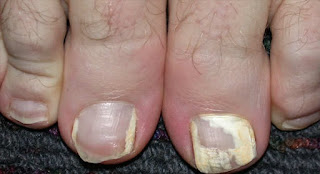HOMEOPATHY FOR TINEA UNGUIUM
Tinea unguium is a common type of fungal infection. It
is also called onychomycosis. The fungus infects the fingernails and, more
commonly, the toenails. It is more common in men, older adults, and people who
have diabetes, psoriasis, peripheral vascular disease, or another health
problem that weakens the immune system.
Tinea unguium is increasingly prevalent with increased
age and spreads from tinea pedis or less often, tinea manuum. It may affect one
or more toenails and/or fingernails and most often involves the great toenail
or the little toenail. It is often confused with non-infected nail dystrophy
due to skin disease, particularly psoriasis, also dermatitis, lichen planus,
viral warts, ageing process.
Causes
Tinea unguium is most often due to Trichophyton rubrum
and T. interdigitale. It should be distinguished from other causes of
onychomycosis:
·
Candida
species, which often cause paronychia.
·
Moulds
including Scpulariopsis brevicaulis, Fusarium spp,. Alternaria, Acremonium,
Scytalidinum dimidiatum and Scytalidinium hyalinum.
It can be present as several different patterns:
·
Lateral
onychomycosis. A white opaque streak appears at one side of the nail.
·
Subungual
hyperkeratosis. Scaling occurs under the nail.
·
Distal
onycholysis. The end of the nail lifts up. The free edge often crumbles.
·
Superficial
white onychomycosis. Flaky white patches and pits appear on the top of the nail
plate.
·
Proximal
onychomycosis. Yellow appear in the half-moon. (lunula).
·
Complete
destruction of the nail.
Symptoms
Signs and symptoms are:
·
Thickened.
·
Whitish
to yellow-brown discoloration.
·
Brittle,
crumbly or ragged.
·
Distorted
in shape.
·
A
dark color, caused by debris building up under the nail.
·
Smelling
slightly foul.
DIFFERENTIAL DIAGNOSIS
·
Contact
dermatitis.
·
Lichen
planus.
·
Malignant
melanoma.
·
Psoriasis
nails.
·
Traumatic
onychomycosis.
A nail unit biopsy may be needed to confirm diagnosis.
HOMOEOPATHIC REMEDIES
Homoeopathy today is a
growing system and is being practiced all over the world. Its strength lies in
its evident effectiveness as it takes a holistic approach towards the sick
individual through promotion of inner balance at mental, emotional, spiritual
and physical levels. When TINEA UNGUIUM is concerned there are many effective
medicines are available in Homoeopathy, but the selection depends upon the
individuality of the patient, considering the mental and physical symptoms.
ANTIMONIUM CRUDUM
Horny or split nails. Nails grow slowly out of shape.
Honey growth under the nails. Feet very tender, covered with large horny
places.
BUFO RANA
Panaritium, swelling blue black around nail, pain in
streaks up arm.
FLUORIC ACID
Nails, distorted, crumble, grow rapidly. Longitudinal
ridges are seen on the nails. Felon. As of a splinter under the nail. Soreness between
toes. Corn’s sore.
GRAPHITES
Nails, brittle and crumbling. Nails deformed, painful,
sore, thick and crippled. Nails, thick, rough ingrown. Cracks and fissures are
seen on tip of fingers, Feet cold, wet. Foul excoriating sweat on feet, worse
evening. Burning in soles and feet.
SILICEA
White spots on nails. Nails, rough, yellow, crippled,
brittle, and having white spots. Corrugated nails. In growing toe nails. Finger tips, as if
suppurating. Finger tips, painful, dry, at night. Felons, deep seated pain. Panaritium.
Offensive sweat, hand and axilla. Icy cold and sweaty feet. Offensive sweat on
feet.
THUJA OCCIDENTALIS
Nail’s brittle, ribbed, soft. Mis-shaped and crumble easily. Ingrowing toe
nail.
GENERAL MEASURES
·
Wash
hands and feet regularly. Wash hands after touching an infected nail.
Moisturize nails after washing.
·
Trim
nails straight across, smooth the edges with a file and file down thickened
areas. Disinfect nail clippers after each use.
·
Wear
sweat- absorbing socks or change socks throughout the day.
·
Choose
shoes made of materials that breathe.
·
Discard
old shoes or treat them with disinfectants or antifungal powders.
·
Wear
footwear in pool areas and locker rooms.
·
Give
up nail polish and artificial nails.



Comments
Post a Comment